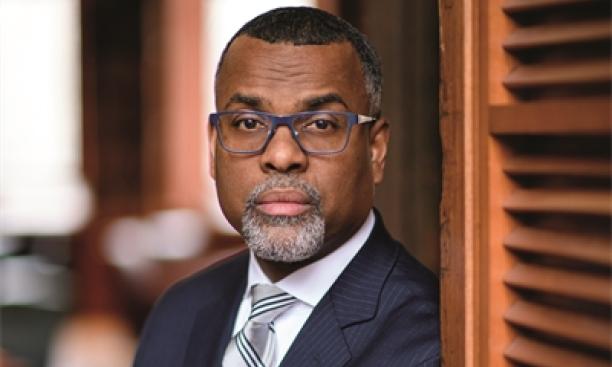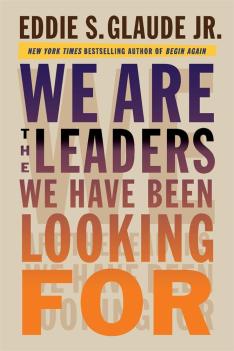
The book: In We Are the Leaders We Have Been Looking For (Harvard University Press), Eddie S. Glaude Jr. *97 challenges America to take control of our democracy. He begins by reflecting on the presidency of Barack Obama, and the unease he felt as Obama was lifted up to represent a prophet-like figure. Sharing a mix of anecdotes and analysis on the writing of great thinkers from Ralph Waldo Emerson to Toni Morrison, Glaude encourages readers to grasp the lessons from the texts and apply them to our current situation. Instead of waiting to be saved, Glaude argues that we have the power to be the heroes our democracy needs to survive.
The author: Eddie S. Glaude Jr. *97 is one of the most prominent scholars in the nation whose work examines the complex dynamics of the American experience. He is the James S. McDonnell Distinguished University Professor of African American Studies at Princeton. He is also on the Morehouse College Board of Trustees and is a frequent media commentator who has made appearances on a variety of shows including Meet the Press on Sundays and Morning Joe.Excerpt:
Chapter 1
On Prophecy and Dr. Martin Luther King Jr.
An act overtly tied out is irrevocable, its consequences cannot be blotted out. An act tried out in imagination is not final or fatal. It is retrievable. — John Dewey, Human Nature and Conduct
Everything now, we must assume, is in our hands; we have no right to assume otherwise. — James Baldwin, The Fire Next Time
At the heart of John Dewey’s philosophy lies a romantic impulse, a vision in which the moral imagination plays a crucial role in our efforts to become who we hope to be as we intelligently engage a complex and perilous world. Here we see the priority of imagination over reason, where intelligent action entails habits and dispositions attuned and attentive to the details of the social world, action animated by passionate commitment and by imagination. Dewey was dissatisfied with the way philosophers characterized reason. Reason is no special faculty set apart from desire and passion. Instead, he preferred talk of intelligence and of the central role of imagination in our efforts to grasp our world and to see what is possible beyond our current conditions of living. In Democracy and Education, for example, he wrote, “Imagination is as much a normal and integral part of human activity as is muscular movement.” We see its role in his 1932 Ethics as the inferential dimension of inquiry, where he holds off Immanuel Kant’s worry about the self-indulgent implications of the imagination. For Dewey, the imagination is more than a playground for epicurean delight; it enables us to reach for the fullness of the complexity of human endeavor; it is that which makes possible a measure of distance from the cultural frames that box us in in order to transform situations and to create ourselves anew.
In this chapter, I want to push a bit farther Dewey’s view of moral imagination. That is, I want to think about how the prophetic as the moral imagination works as a dimension of critical intelligence — as a decision of conduct, directed toward an as yet realized present, under conditions where matters of justice are at stake. Here my aim is rather ambitious. I want to recast the prophetic in light of my reading of pragmatism. In my view, the prophetic mode isn’t bound up with a form of exhortation and judgment rooted in a truth that originates elsewhere. Nor is it only about measuring the failures of the present over against the moment of covenant or a past when we got it right. Instead, as I will suggest, the prophetic is that feature of critical intelligence, in the context of particular problems faced and tragedies endured, in which life as it is experienced is critically engaged in light of life as it could be. The prophetic isn’t backward looking; it is prospective in its function. Making this claim will involve a close reading of Dewey and his understanding of the moral imagination. Throughout I suggest, and I am well aware that this is a strong reading, that the moral imagination, within the exercise of critical intelligence, functions much like prophecy in its romantic register. I insist that the power of prophecy rests within us, not outside of us or as the special possession of a chosen few.
All of this is to lay the groundwork for some preliminary reflections on how we might reconstruct the idea of the prophetic and the heroic in African American democratic life. This effort assumes a deep-seated suspicion about the democratic character of the prophetic tradition in African American politics and involves an admittedly idiosyncratic reading of Dr. Martin Luther King Jr. as a romantic prophet. In the end, I worry about the ways a certain view of the prophetic mode distorts and disfigures democratic debate within Black political life as some assert an authority that exists apart from the demos. The underlying purpose here is to reconceive what freedom struggles can be and do, and who ought to be their principal agents.
John Dewey, Prophecy, Neoliberalism
What occasioned these reflections, beyond my general dissatisfaction with Black political elites, was an odd encounter in Dewey’s corpus. I was rereading Individualism Old and New (1930) and was struck by its current relevance. Dewey offers a trenchant critique of an inherited view of individualism that denies the capacities of human beings to engage in intelligent action. This denial deepens individual conformity to unjust arrangements as Americans, then as now, stand by silently in the face of deepening wealth disparity and widening social misery. As Dewey would later argue in his 1936 address at the Harvard Tercentenary Conference of the Arts and Sciences, this view of individualism, “in the very act of asserting that it stood completely and loyally for the principle of individual freedom, was really engaged in justifying the activities of a new form of concentrated power — the economic, [a] new form, to state the matter moderately, [which] has consistently and persistently denied effective freedom to the economic[ally] underpowered and underprivileged.” Dewey anticipates one of the central features of neoliberalism — what the philosopher Wendy Brown describes as its political rationality.
In Brown’s view, neoliberalism isn’t simply “a set of economic policies; it is not only about facilitating free trade, maximizing corporate profits and challenging welfarism.” The very things we associate, say, with Reaganism or Thatcherism. Rather, neoliberalism instantiates a particular way of life and governance that extends the market into the very idea of who we take ourselves to be. As Brown writes, “Neoliberalism normatively constructs and interpellates individuals as rational, calculating creatures whose moral autonomy is measured by their capacity for ‘self-care’ — the ability to provide for their own needs and service their own ambitions.” She goes on to say that “a fully realized neo-liberal citizenry would be the opposite of public-minded, indeed it would barely exist as a public. The body politic ceases to be a body but is, rather, a group of individual entrepreneurs and consumers” in competition with themselves. The result, of course, is a contraction of the idea of the public good and an anemic view of mutual obligation because selfishness and greed trump all other values.
Dewey appeared to be tracking this development in its earliest phase and argued that what was needed in response to these conditions was a reconstructed notion of individuality consonant with the moment, in which “ideas and ideals are brought into harmony with the realities of the age in which they act.” With liberalism’s failure, what was required was a more adequate view of individuality in light of market forces that sought to contain democratic energies. We needed to imagine ourselves and our being together differently if we were to respond effectively to the new forms of concentrated power.
This reconstructed view of individualism, Dewey maintained, would be decidedly social and seen as developing within and through interactions with our fellows and by means of enabling social structures (e.g., public schools). In the interim, forces would continue to unhinge the old individualism.
Instances of the flux in which individuals are loosed from the ties that once gave order and support to their lives are glaring. They are indeed so glaring that they blind our eyes to the causes which produce them. Individuals are groping their way through situations which they do not direct and which do not give them direction. The beliefs and ideals that are uppermost in their consciousness are not relevant to the society in which they outwardly act and which constantly reacts upon them. Their conscious ideas and standards are inherited from an age that has passed away; their minds, as far as consciously entertained principles and methods of interpretation are concerned, are at odds with actual conditions. This profound split is the cause of distraction and bewilderment.
Dewey does not specify the nature of the new idea of individuality; he does “not see how it can be described until more progress has been made in its production.” Instead, he urges us to redirect our energies and to redeploy our imaginations in the service of creating a context in which a new individuality could in fact emerge and flourish.
I should say a word about the place of reconstruction in such an effort. Reconstruction characterizes an intellectual procedure that involves, among other things, refurbishing ready-at-hand terms that have lost their clarity because of the changing conditions informing their use. What is implied by the use of a word or a phrase (e.g., “individualism,” “race,” or “the color line”) at the dawn of the twentieth century might not register the same meanings in the second decade of the 21st century and in the context of neoliberalism’s stranglehold. Failure to attend to those differences may result in confusion and misdiagnoses. Yet unclear words still influence how we see, describe, and understand our experiences. Reconstruction, then, amounts to (1) a strong reading of the currency of particular words (in light of problems faced with intelligence), (2) an attempt to establish an original relation to their use (by exposing a bad question at the heart), and (3) an effort to open their meanings to doings and sufferings currently in view (by revealing historical nerve endings that excite the present). We see philosophers of race who aren’t eliminativists (those who argue that we should rid ourselves of race talk altogether) do this with race language, for example. They offer us a way to think about the word that orients us more effectively to our current circumstances. For Dewey, “reconstruction can be nothing less than the work of developing, of forming, of producing (in the literal sense of that word) the intellectual instrumentalities which will progressively direct inquiry into the deeply and inclusively human — that is to say, moral facts — of the present scene and situation.” A reconstructed view of individualism, in this case, does exactly that given the way the old view of individualism denied/denies freedom by perversely claiming it.
Reviews:
“Though they speak directly to tendencies within the ongoing Black political struggle, the wisdom these important essays offer about the true nature of democratic action is equally relevant to all Americans seeking to rebuild a ravaged democracy and its broken institutions. A powerfully eloquent, concise book.” — Kirkus Reviews
“A call to rethink American leadership.” — Diane Rehm, WAMU

